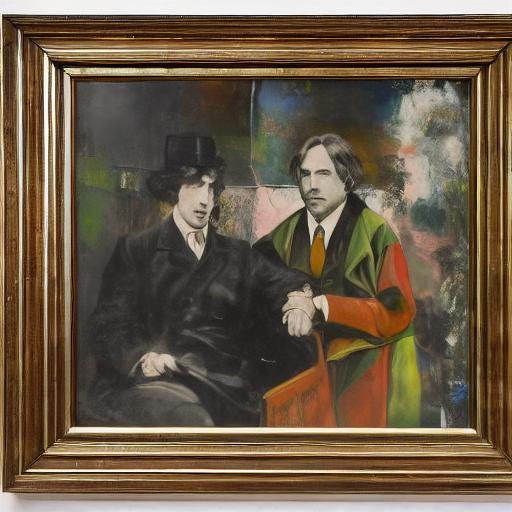....It was at Oxford that an event occurred that was to alter his whole conception of himself. Wilde contracted syphilis, reportedly from a woman prostitute. b As a doctor’s son, he had been inclined to minimize illness, so this came as an especially crushing blow. In the 1870s, medical authorities followed Sir Jeremy Hutchinson’s advice that anyone contracting the disease should wait two years before marrying, and undergo a course of mercury treatment. The main physical effect of mercury on Wilde was to turn his slightly protrusive teeth black, so thereafter he usually covered his mouth with his hand while talking. (Mercury did not cure the disease, though it was reputed to do so.) But the mental effect was profound. Like his father he had been subject to fits of melancholy; now there was a new warranty for them.
The awareness of his vulnerability was related to a sense of doom which he said in De Profundis was pervasive in his works. It had distant connections with a sense of doom that he had most poignantly encountered in adolescence, in Aeschylus’s Agamemnon. That play had never been far from his thoughts, and in 1877 he published in Kottabos his translations of some speeches of Cassandra and the Chorus from it. His accompanying note emphasized ‘doom’: ‘Agamemnon has already entered the House of Doom, and Klytaemnestra has followed close on his heels—Kasandra is left alone upon the stage.… She sees blood upon the lintel, and the smell of blood scares her.… [‘I have slipped in blood. It is an evil omen,’ Wilde’s Herod would say.] Her second sight pierces the palace walls; she sees the fatal bath, the trammelling net, and the axe sharpened for her own ruin and her lord’s.’ Wilde did not confuse his own doom with Agamemnon’s, but the sense of a strange fatality hanging over him did not leave his consciousness.
His poems offer some evidence of his feelings. In ‘Taedium Vitae’ he speaks of ‘that hoarse cave of strife / Where my white soul first kissed the mouth of sin.’ This may have been the poem advertised by a bookseller as addressed to the woman from whom Wilde contracted syphilis. 35 In ‘The Sphinx’ the speaker, a student, says in an impassioned moment,
Are there not others more accursed, whiter with leprosies than I?
Are Abana and Pharphar dry that you come here to slake your thirst?
This allusion is to the leprosy about which in the Old Testament Naaman, the Syrian captain, consults the prophet Elisha. On being told to bathe in the Jordan, Naaman indignantly replies, ‘Are not Abana and Pharphar, rivers of Damascus, better than all the waters of Israel?’ (II Kings 5:12) Wilde’s interest in Naaman continued; he gave his name to the executioner in Salome . c An unused line for ‘The Sphinx’ addresses her as ‘You mirror of my malady.’ The portrait of Dorian Gray was another such mirror. Its composition was contemporary with his being ‘grievously ill, of a “nervous fever,” ’ which Lionel Johnson suspected to be the result of ‘Tiberian excess.’ 36
Upset as he was, Wilde came as close now to becoming Catholic as he ever would until his deathbed....
....He adopted mercury rather than religion as the specific for his dreadful disease. Perhaps now the parable of Dorian Gray’s secret decay began to form in his mind, as the spirochete began its journey up his spine towards the meninges....
Oscar Wilde by Richard Ellmann (1988)



